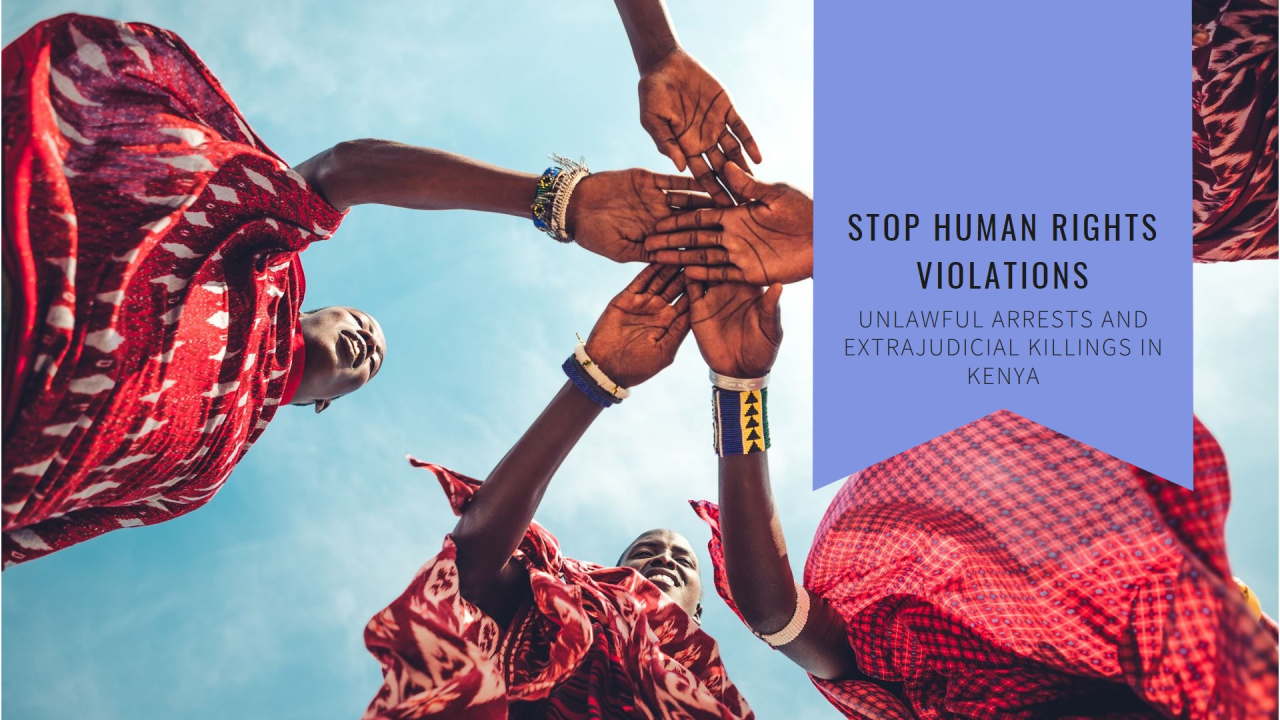
1. Introduction to Unlawful Arrests and Extrajudicial Killings
Unlawful arrests and extrajudicial killings are the most serious forms of human rights violations and offenses. They occur when a public official unlawfully takes an individual into custody or unlawfully kills an individual. Both types of violations are highlighted in the provisions of the Constitution of Kenya, 2010, and the African Charter on Human and Peoples’ Rights.
Extrajudicial killings and unlawful warrantless arrests are systemic problems in Kenya. Multiple reports are proof of this fact. Both in rural and urban Kenya, these incidents involve low-level “criminal” suspects, as well as serial cattle rustlers and terrorist suspects on the coast. There is ample documentation of the prevalence of extrajudicial killings in urban slums, as well as in the regular police work performed by the Kenyan police. Statistically, it is difficult to fully capture the scale of the extrajudicial killings, as many of these incidents are covered up or defended by police as a form of self-defense.
In the past few years, the Kenya Police have publicly claimed they are reforming to protect human rights during their duties and arrests. Both the government of Kenya and various oversight bodies insist that they do not condone police crimes. At the same time, the Kenyan police service and other security agencies have often blamed the public for provoking the police to kill or use excessive force. What is striking about a section of the Kenyan public and police officers’ response to unlawful killings is the sense of apathy and acceptance regarding killings.
2. Historical Context and Root Causes
The incidences have increased in the last few years, but there is scant information about the affected populations, places, and perpetrators.
It is not possible to understand unlawful killings and arrests outside the context of both the long-term socio-historical contexts, as well as specific, more proximate political-institutional contexts. The primary conclusions are that there is a long history of failure in governance and a corresponding culture of impunity that has fostered extrajudicial killings as one of the mechanisms for the management of politics and political opponents in the country. The failure of the turn of the colony and post-colonial economies, along with their subsequent inability to meet the needs and aspirations of their people—including, most importantly, the administration of justice—are the root causes of the contemporary crisis of extrajudicial killings, as well as a host of other social and political ills.
First, it is important to situate the issue of police conduct within Kenya’s history. The issue is a deeply historical one, whose beginnings stretch deep into the colonial era, into the system of suppression and subordination that served as a matrix of colonial domination. While advanced societies have been able to harness industrial and scientific advancements to build an impressive infrastructure of physical, psychological, and social control, and integrate it into a democratic political infrastructure, such has not been the case for Africa. Like Kenya, the majority of African states are shamelessly oppressive. The state and the society that populate those states stand condemned by one of the grandest and cruelest historical ironies that a people can suffer—that of not living up to the destiny of a forward-looking 21st-century world. The objective of investigations into police conduct should therefore be to incorporate this serious general state of social injustice into a coherent framework of reform. The primitive public discussion of professionalism in the police cannot substitute for an investigation of the historical and social context that brought about the existence of the force as it is. Given that the malaise affects not only the police, the crisis of a more equal and just society cannot be resolved on the streets.
3. Impact on Society and Victims
Kenyans are a deeply traumatized society. The emotional, social, and economic repercussions of unlawful arrests and extrajudicial killings can be so traumatic for victims and their relatives that they suffer in silence. The pain and disillusionment that relatives of the victims of both unlawful arrests and extrajudicial killings suffer are not only intense but also long-lasting, creating a void, a nothingness, as victims themselves testify. Some have been known to wander from place to place, searching for advice, relief, and support, where neither judgment nor condemnation is part of the equation. The absence of a listening ear continues to diminish trust in executive authorities and a belief in the ability of humanity to do good. “When such life is drawn to the altar of death and the innocent blood drawn to the street and the land, no one may carry it to the competent authority as it is suffered in silence,” a widow testified in the case of her husband.
Testimonies from the victims reveal lives that are full of indescribable physical and emotional pain. One individual, who was killed following an unlawful arrest, had “the good of his life expunged when he breathed his last under extrajudicial quality after being accosted from a public place unlawfully in the thicket of the night at 2 a.m. Agonized he was by violence compounded by abuse by bullets in several parts. A good life of human potential became extinct, and his rightful place changed into the land of hopelessness and despair.” Such human stories convey the misery of life and the extent of physical and emotional suffering of people trapped in a never-ending cycle of violence. A young person, at the age of 17, not only recounted the sad story of losing her father but also told of how her studies went downhill immediately after her father’s murder. The chronic inability of those seeking justice for crimes of this nature has sustained the scourge of illegal arrests and arbitrary executions. Victims and survivors live with mental torture made worse by the hopelessness in seeking justice and fairness. Many are afraid of making a report to the police, some fearing for their lives.
4. Legal Framework and International Standards
Kenya has an advanced system of law in place. The 2010 Constitution explicitly protects the human rights of citizens and imposes certain obligations on the security organs. Furthermore, Kenya is a party to several international treaties and conventions that underscore the duty to respect and protect human rights. Nonetheless, the degeneration of the human rights situation indicates a lack of political goodwill to address the shortcomings of the existing legal and institutional framework. This section provides a comprehensive analysis of the principal international, regional, and national laws, guidelines, and case law that relate to protection from unlawful arrest and prevention of extrajudicial killings for persons in the custody of law enforcement and security agencies. It identifies the gaps in the existing frameworks and mechanisms that allow human rights violations to persist.
The principle of legality should require enforcement agencies to abide by the laws and international principles. However, the human rights situation in Kenya indicates a lack of adherence to the law and a culture of impunity within the enforcement agencies. This culture is perpetuated by the lacunae in the law that allow security agencies to commit human rights violations with little fear of being held accountable for their actions. Furthermore, Kenya’s history of military rule has led to a dichotomy of civilian and military justice systems, which has played a key role in reintroducing a culture of impunity. The judiciary in Kenya has frequently interpreted the Constitution in a manner that is not in keeping with international standards on human rights. Judges in Kenya still “erroneously presume that their ‘primary duty is not to protect individual citizens from the state but, when their rights are violated, to protect the state’s interest in the assumption that it is acting legally.”
5. Case Studies and Recommendations
On 16 August 2017, Fredrick Mading’He was in his house with his wife in Mathare North, Nairobi, when the Mathare North police extrajudicially executed him. Child of the Sky, their son, and Fredrick’s mother-directress, artist, and theologian, witnessed the invasion of her apartment: Uncle Kim was an undercover officer. Sky’s immediate neighbors were also under the protection of Uncle Kim and other officers. They helped to arrange Fredrick’s extrajudicial execution by ensuring the door to Fredrick’s and Ken’s home was bolted shut before the operatives attacked Fredrick. Sky intervened to save Fredrick rather than to record the police targeting of her family. Police officers blocked security cameras in her apartment complex and did not disseminate recordings of what occurred during the police operation. When Deputy OCS Kagundo was arrested in June 2021, he called Fredrick to assign blame to Ken and ask for assistance to facilitate his escape from prison. Fredrick declined.
Governments should allocate adequate resources towards support for civil society in lobbying for human rights reforms in their own countries and transnational.
Allocate resources to programs that search for, recognize, and collaborate with willing chiefs who will transform the state of social injustice into a coherent reform framework.
The primitive public discussion of professionalism in the police cannot substitute for an investigation of the historical and social context that brought about the existence of the force as it is. Given that the malaise affects not only the police, the crisis of a more equal and just society cannot be resolved on the streets.
